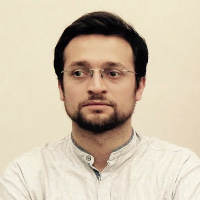The Interaction of Image, Movement and Time in Architecture and Cinema According to Gilles Deleuze's Theories
Author(s):
Article Type:
Research/Original Article (دارای رتبه معتبر)
Abstract:
Cinema is one of the most important phenomena of the modern age. Cinema is a way of seeing, that is not solely dependent on the human eye, rather it is capable of manipulating all human senses so that it affects thought and perception. The simultaneous development of cinema and modern architecture in late nineteenth century instigated important changes in thought, experience and progressive lifestyle, and became an indication of the close relationship between these two arts. In this context, the French philosopher Gilles Deleuze offers a different world-view based on a redefinition of the concepts of movement, image and time. This research, which was carried out with a theoretical, qualitative, descriptive-analytical approach, proposes Deleuze's unique definitions of image, movement and time as a means to illustrate the close relationship between cinema and architecture. The paper begins by explaining how cinema, architecture, or any other art, can be ways of thinking and creating new concepts. It then shows how Deleuze combines philosophy and cinema to define three types of movement: “Movement and Instant,” “Privileged-Instant/Any-Instant-Whatever,” “Movement and Change.” He goes on to categorize the “Movement-Image” into three types: “Perception-Image,” “Action-Image,” “Affection-Image.” In this theory, everything is an image. In other words, all the components and events of the universe are a collection of images that interact and react to each other. These interactions occur in the context of time, resulting in the concept of “Time-Image” and “Movement-Image.” Time for Deleuze is the life force for movement and becoming. Time is nothing but the present, or the present that has become thought. The concept of “Time-Image” is a challenge, with the aim of thinking about the potential of the flow of time. The image is not always in the present, but at different levels of time, past and future. In the concept of “Time-Image,” time shrinks and expands in relation to the past and the future. These concepts offer an alternative understanding of the relationship between philosophy and art and our perception of the world. In this philosophical approach and according to such definitions of image and time, there exists a much closer relationship between cinema and architecture. The concepts of Movement-Image and Time-Image can be defined as fundamental concepts of both of these arts. The three concepts of Perception, Affection, and Action and the intertwining of Time components with them, can be appropriated for architecture, thus changing our understanding of architectural space and design. By defining and redefining concepts in cinema and architecture, Deleuze develops a new way of thinking in which art, philosophy, and science together form the story of life. In this alternative mode of thought, everything is image, and everything in the world is a set of images that affect and react to each other. When reality is composed of images that, in combination with movement and time, create feelings, actions and complex human concepts, then the value of art, especially cinema and architecture, gains a new significance due to the fast that this era has become more dependent on images.
Keywords:
Cinema , Architecture , philosophy , Movement , Image , time
Language:
Persian
Published:
Honar-Ha-Ye-Ziba: Honar-Ha-Ye Mosighi Va Namayeshi, Volume:28 Issue: 77, 2023
Pages:
31 to 42
https://www.magiran.com/p2586936
سامانه نویسندگان
مقالات دیگری از این نویسنده (گان)
-
Interiority and its Manifestation in Urban Interiors
Seyed Morteza Mahdavi Ardakani, *, Maryam Darbandi
Journal of Interior Architecture Research, -
Reading Layers of Meaning in Façades of Contemporary Mid-Rise Residential Buildings in Tehran
Sara Azma, Alireza Einifar *, S. Yahya Islami
Journal of Architect, Urban Design & Urban Planning,



